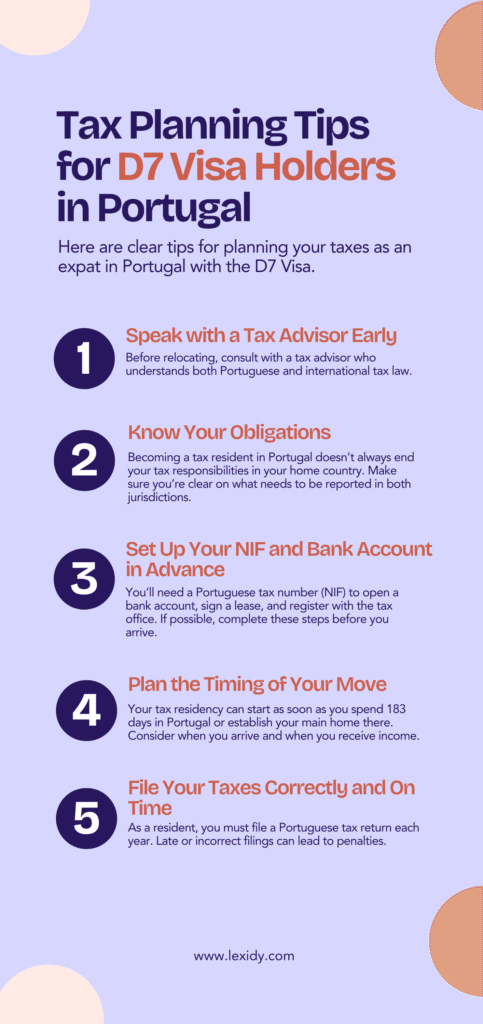If you’re moving to Portugal with the D7 Visa, understanding how your income will be taxed is essential. Portugal D7 Visa taxes can affect your pension, rental income, or investment earnings, especially now that the tax rules have changed.
Until recently, new residents could apply for the Non-Habitual Residency (NHR) program, which offered generous tax breaks. But that program ended for new applicants in December 2024.
Now, D7 Visa holders are taxed under Portugal’s general system, which means your worldwide income will be fully taxable once you become a tax resident. If you’re planning to retire or live off passive income, knowing what to expect helps you avoid surprises and plan ahead.
In this blog, learn how tax residency works with the D7 Visa, what the end of NHR means for new arrivals, how different types of foreign income are now taxed, and what steps you can take to minimize your tax burden in Portugal.
Table of Contents
- Portugal’s D7 Visa and Tax Residency
- End of NHR: What It Means for New D7 Visa Applicants
- How Passive Income Is Now Taxed in Portugal
- Practical Tax Planning Tips for D7 Visa Holders
- Common Misunderstandings About Portugal D7 Visa Taxes
- Why Work With a Lawyer and Tax Advisor
- Frequently Asked Questions About Portugal D7 Visa Taxes
- Conclusion
Portugal’s D7 Visa and Tax Residency
The D7 Visa is designed for non-EU citizens who have a stable source of passive income. It allows you to live in Portugal and, after arrival, apply for a residence permit. Once that permit is granted, most D7 visa holders become tax residents of Portugal.
When Do You Become a Tax Resident?
You are considered a tax resident in Portugal if either of the following applies:
- You spend more than 183 days in Portugal in any 12-month period
- Portugal becomes your main place of residence or economic ties, even if you stay fewer than 183 days
- For most D7 visa holders, reaching the 183-day threshold is part of the visa conditions, so tax residency usually begins during the first year of living in Portugal.
What Does That Mean for Your Income?
Once you’re a tax resident, your worldwide income becomes taxable in Portugal. This includes:
- Pensions
- Dividends
- Rental income
- Interest and other investment income
Even if this income is generated abroad, it must be reported to the Portuguese tax authorities and may be taxed under the general regime.
Need help applying for the Portugal D7 visa requirements? Let our legal team guide you through each step.
End of NHR: What It Means for New D7 Visa Applicants
For many years, the Non-Habitual Residency (NHR) program helped D7 visa holders reduce their tax burden in Portugal. It allowed low or even 0% tax rates on foreign income like pensions, dividends, and royalties for up to 10 years.
But the NHR regime officially ended in December 2024.
Today:
- New D7 visa applicants cannot apply for NHR
- Only those who registered before the deadline can still benefit from it
- Everyone else is now taxed under Portugal’s general income tax system
The NHR was replaced by a new incentive called the Tax Incentive for Scientific Research and Innovation (IFICI). However, this program is designed for professionals working in specific sectors for Portuguese-based companies. It does not apply to individuals who rely solely on passive income such as pensions, rental income, or dividends.
In short, passive income earners moving to Portugal today will not qualify for the same tax breaks that NHR once offered.
How Passive Income Is Now Taxed in Portugal

With the end of NHR, D7 visa holders are now taxed under Portugal’s general tax regime. This system applies flat rates of 28% on most passive income and 25% on dividends, while pensions are taxed at progressive rates.
General Income Tax Rates for 2025
Portugal uses a progressive tax system called IRS (Imposto sobre o Rendimento das Pessoas Singulares). The more you earn, the higher the percentage of tax you pay. Here’s a simplified breakdown of the 2025 income tax brackets:
| Annual Income (EUR) | Tax Rate |
| Up to €8,059 | 13.25% |
| €8,060 to €12,160 | 18% |
| €12,161 to €17,233 | 23% |
| €17,234 to €22,306 | 26% |
| €22,307 to €28,400 | 32.75% |
| €28,401 to €44,987 | 37% |
| €44,988 to €51,997 | 43.5% |
| €51,997 to €83,696 | 45% |
| Over €83,697 | 48% |
Keep in mind that tax is applied per bracket. Only the amount that falls within each range is taxed at that rate.
How Common Income Types Are Taxed
Here’s how key sources of passive income are treated under the general regime:
- Foreign pensions: Taxed as regular income using the brackets above.
- Dividends: Typically taxed at a flat rate of 28%, although residents can choose to include them in their total income to be taxed at progressive rates.
- Rental income: Taxed at a flat rate of 25%, after deducting eligible expenses like maintenance, insurance, and property taxes.
- Royalties and interest income: Generally taxed at 28%.
- Capital Gains from Securities: taxed by 28% or by progressive rates in some circumstances.
Avoiding Double Taxation
Portugal has tax treaties with many countries that help prevent double taxation. These agreements may allow you to deduct taxes already paid abroad or pay a reduced rate in the source country, depending on the income type and treaty terms.
If you receive income from countries like the United States, the United Kingdom, or Canada, it’s worth reviewing the specific treaty terms or consulting a tax advisor to confirm how much tax you’ll owe and where. Contact us using the form below for a free consultation.
Want to avoid costly mistakes? Get legal clarity on filing taxes in Portugal with the D7 Visa.
Practical Tax Planning Tips for D7 Visa Holders

Once you become a tax resident in Portugal, you’ll be responsible for reporting your worldwide income. To avoid unexpected tax bills or compliance issues, it’s important to prepare before making the move.
Here are some practical tips to help D7 visa holders manage their tax situation:
1. Speak with a Tax Advisor Early
Before relocating, consult with a tax advisor who understands both Portuguese and international tax law. They can help you understand how your income will be taxed in Portugal and whether any tax treaty benefits apply.
2. Know Your Obligations in Both Countries
Becoming a tax resident in Portugal doesn’t always end your tax responsibilities in your home country. For example, U.S. citizens must continue filing federal tax returns. Make sure you’re clear on what needs to be reported in both jurisdictions.
3. Set Up Your NIF and Bank Account in Advance
You’ll need a Portuguese tax number (NIF) to open a bank account, sign a lease, and register with the tax office. If possible, complete these steps before you arrive, especially if you’re planning to receive income in Portugal soon after moving.
4. Plan the Timing of Your Move and Income
Your tax residency can start as soon as you spend 183 days in Portugal or establish your main home there. Consider when you arrive and when you receive income. For example, deferring pension withdrawals or dividends until after a tax year may reduce your liability.
5. File Your Taxes Correctly and On Time
As a resident, you must file a Portuguese tax return each year. Late or incorrect filings can lead to penalties. Working with a qualified accountant or legal expert can help ensure everything is submitted properly.
Common Misunderstandings About Portugal D7 Visa Taxes

The end of the NHR regime has created a lot of confusion about what D7 visa holders can expect when it comes to taxes. Here are three common questions and the facts you need to know.
“Foreign income is still tax-free in Portugal.”
Incorrect. Unless you were already approved under the NHR program before March 31, 2025, your foreign income is now taxed under Portugal’s general income tax rules. This includes pensions, dividends, rental income, and interest earned abroad.
“If I don’t work in Portugal, I don’t have to pay taxes here.”
Not true. Even if you don’t earn income in Portugal, becoming a tax resident means you must report and possibly pay taxes on income earned anywhere in the world. This applies to pensions, investment income, and even rental earnings from your home country.
“I can still apply for NHR.”
Not anymore. The Non-Habitual Residency program ended for new applicants after March 2025. If you were not already accepted into the regime by the deadline, you’ll be taxed as a regular resident under the standard system.
“I will be double taxed if I move to Portugal.”
Not necessarily. Portugal has tax treaties with many countries to prevent double taxation. These agreements may allow you to avoid paying tax twice on the same income or to claim a credit for taxes already paid in your home country. The specific outcome depends on your country of origin and the type of income.
To be sure, speak with a tax advisor who can check the terms of the treaty between Portugal and your home country. Fill out the form below for a free first consultation.
Why Work With a Lawyer and Tax Advisor
Relocating to Portugal on a D7 Visa isn’t just about getting your paperwork approved, it’s also about protecting your income and staying compliant with the country’s tax laws. Here’s why working with both a lawyer and a tax advisor is essential.
1. Immigration and Tax Are Closely Connected
Becoming a resident in Portugal means becoming a tax resident, often in the same year. The timing of your visa, your move, and your income matters. Working with an experienced lawyer alongside a tax expert can help you line everything up correctly from the start.
2. Avoid Costly Mistakes
Incorrect filings, missed deadlines, or misunderstandings when tax residency begins can lead to penalties or double taxation. A tax advisor will ensure your income is reported properly and that you benefit from any applicable treaty protections.
3. Plan Strategically Before You Move
From when to enter the country to how and when you receive income, timing is key. With the right advice, you can optimize your arrival and financial setup in a way that minimizes tax exposure and meets all legal requirements.
4. One Team for Everything
Lexidy’s integrated legal and tax team works together to offer seamless support. That means no back-and-forth between separate firms, just one coordinated plan that covers your visa, tax residency, and financial reporting from day one.
Frequently Asked Questions About Portugal D7 Visa Taxes

Is Portugal still tax-friendly for retirees?
Portugal no longer offers the same tax breaks it once did under the NHR program. However, depending on your country of origin and the type of income you receive, you may still benefit from tax treaties or careful tax planning.
Many retirees continue to choose Portugal for its lifestyle, cost of living, and access to healthcare, and structure their finances accordingly.
Do I have to declare my foreign income?
Yes. Once you become a tax resident in Portugal, you must declare all worldwide income. This includes pensions, dividends, rental income, and investment earnings, even if the money stays in a foreign account.
What if I already applied for NHR before March 31, 2025?
If your application for NHR was submitted and approved before the March 31, 2025 deadline, you can still benefit from the program for up to 10 years. If you applied but were not approved before the cutoff, the general tax regime will apply instead.
Conclusion
Portugal remains one of the most attractive destinations in Europe for retirees and financially independent individuals. But with the end of the NHR program, tax planning has become essential for D7 visa holders.
Today, new residents are taxed under Portugal’s general tax regime, which applies to worldwide income. That includes pensions, dividends, rental income, and more. Understanding your obligations early and getting the right guidance can help you avoid costly surprises.
Ready to Optimize Your Portugal D7 Visa Taxes?
If you’re planning your move, consider speaking with legal and tax experts who can help you make the right decisions from the start. Fill out the form below to get started!

